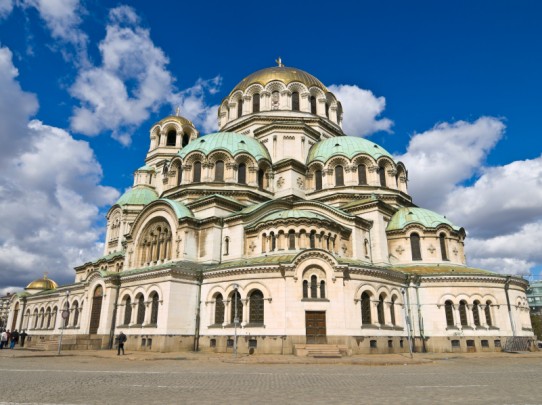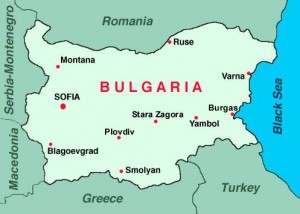

The specific role of Bulgaria in the Black Sea and as a NATO member State.

Alexander Nevski Church a Sofia, Bulgaria
Continuano gli approfondimenti sulla crisi ucraina e la sua influenza in quel settore strategico, dopo aver analizzato il ruolo della Romania.
Il Direttore scientifico: Maria Gabriella Pasqualini
During the Cold war, Bulgaria was one of Moscow’s staunchest allies. What is its role in NATO strategy in the Black Sea today? For many centuries, Bulgaria was culturally and politically close to Russia, a proximity strengthened by common religious and linguistic roots and particularly intensified during the Soviet period, when Bulgaria became a sort of iron ally of Russia/the Soviet Union.
It has continued good relations with the Russian Federation up to this day because of these elements of linguistic and cultural proximity, but mainly because of its almost total energy dependence on Russia, which subjects Bulgaria to a sort of energy blackmail, or at least to extremely powerful forms of pressure. Bulgaria, which since 2007 is inwardly torn between a “progressive” “European and Western soul” and the need to maintain good relations with the “big sister Slavic nation” following the crisis in Ukraine, has reached a difficult crossroads in its foreign policy.
Furthermore, Bulgaria has become an essential element for US power projection towards the Middle East and Central Asia, and this very important logistic function forces it to make very careful choices in its foreign policy. The latter mainly centers on the preservation of the trade routes through the Black Sea and good political and commercial relations with its neighbors, although lately Bulgaria is trying to detach itself progressively from this Russian energy dependence, abiding also to EU energy regulations aimed at substantially reducing Russia’s domination in Eastern Europe in this sector.
It is also trying to detach itself from dependency on Russia for weaponry maintenance, especially regarding the obsolescent MiG 29s, as in the past Russia has often supplied the Bulgarian air force with Soviet and Russian warplanes and provided it with costly maintenance contracts for the planes. This military supply has clearly not only an economic importance, but also a political one, in the sense that for many years Russia kept supplying Bulgaria with a constant flow of weaponry and providing it with military maintenance and assistance, despite the fact that the country became a NATO member in 2004.
This sale of weaponry is viewed with concern by European and NATO authorities as an unduly interference in a country that is a part of the Euro-Atlantic community, but perceived by Russia as vital strengthening of its influence in the strategically vital Balkans region and as a source of substantial economic gain and leverage due to the necessity of Bulgarian air force to obtain regular maintenance of its MiG airplanes[i].
This Russian-Bulgarian commercial litigation and Russia’s threat to deny maintenance[ii] and provision of spare parts for airplanes has both commercial and political and strategic roots, as both NATO and Russia are obviously aware. In the West–Russia confrontation, matters are never exclusively political or purely commercial. The two aspects are often inextricably interconnected, although most Russian industries are connected to the state apparatus and work in synergy with the latter.
The United States, on the other hand, have often purely private enterprises that may or may not be linked to the state administration. This Bulgarian–Russian commercial litigation, implicitly also a political-strategic one, is an example of the Soviet-Russian paradigm of zero sum game with the West[iii]. The Balkan region appears to be one of the most disputed areas between Russia and the West precisely because there are conflicting interests in terms of strategic importance, energy routes, commercial interests and cultural links between Balkan countries, especially between Bulgaria, Serbia (that is still neither an EU nor a NATO member) and Russia.
Inside these countries there are also Westernizing parties that would like to detach themselves from the corruption and low income outcomes of the post-communist period, rejecting its legacy and “legal nihilism” and wanting to adhere to the Western values of government accountability, transparency, effective tax collection, systemic contrast to corruption and illegal trafficking etc. In any case, Bulgaria’s internal problems due to bad administrative and political management and internal divisions, directly influence the political and strategic importance of the country from NATO’s point of view. A definitive adoption of the European or Western model is therefore important to secure stability and to protect Bulgaria from Russian interference or at least, as the Bulgarians themselves say, to set them on a pragmatic and balanced political base that also takes into account the cultural, historical, economic and security relations that bind the two Slavic and orthodox countries. Indeed, in Bulgaria we find pro-Russian movements and in Russia pan-Slav ones, like Zhirinovsky’s Liberal-Democratic Party, which calls for more Russian influence in the Balkans
Bulgaria as a hotspot of confrontation between Russia and the West in the Balkans
Bulgaria has thus become one of the hotspots of direct non-military confrontation between the EU and Russia and, indirectly, between NATO and Russia, because of the strengthening of US military bases in the country and on the Bulgarian Black Sea ports, such as Burgas or Varna, which can provide access to the Black Sea for both civil and military equipment. Apart from the military aspect, Bulgaria is aware of the extremely important transformational effect that NATO and the EU may have on internal stability, for instance the fight against corruption and achieving a streamlining of the public administration and political life in accordance with Western parameters,[iv] or the fight against human trafficking, the narcotics trade and international terrorism, along with the struggle for external stability, as Bulgaria finds itself in the Balkans and on the shores of the Black Sea, both at once sensitive and strategic areas. Bulgaria is therefore interested not only in being an active member of NATO and the EU, but also in an enlargement of the Euro-Atlantic structures to other areas of the Black Sea, such as Ukraine and Georgia, because this would sensibly enhance the overall security of the area.
Bulgaria is also interested in good pragmatic relations with the Russian Federation, its ancient master in the Cold war era and now its fellow Orthodox brother and energy partner. Bulgaria wants to be an equitable partner for the Russian Federation, but without being captive to its energy and geopolitical interests. In the Bulgarian political arena both the Euro-Atlanticist and Russophile political factions agree on the fact that a modus vivendi must be pragmatically found between the Russian Federation and the West in the sensitive and highly strategic arena of the Balkans and the Black Sea, which links Western Europe, a huge energy consumer, to the energy-rich area of the Caspian Sea.
[i] http://www.rg.ru/2015/10/16/mig-anons.html “The MiG corporation threatened not to renew maintenance contracts for Bulgarian air force”
[ii]http://news.rambler.ru/politics/31816902/?utm_source=adfox_site_36985&utm_medium=adfox_banner_1467661&utm_campaign=adfox_campaign_495794&ues=1
[iii] http://tass.ru/en/defense/829504
[iv] http://www.bbn.gov.pl/ftp/dok/07/BGR_National_Security_Strategy_Republic_Bulgaria_2011.pdf
www.osservatorioanalitico.com – Riproduzione riservata


Commenti recenti